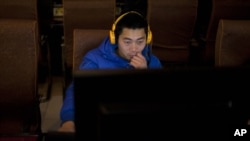Is China planning to unblock Facebook, Twitter and the New York Times in the Shanghai Free-Trade Zone or not? And, if they are going to, does it really matter?
A flurry of worldwide reports that China was planning to unblock the sites was kicked off Wednesday after the South China Morning Post reported Beijing was planning to make the sites accessible in the free zone.
The next day, Xinhua, the state media, quoted the People’s Daily as saying “The management measures over the Internet at the China (Shanghai) Pilot Free Trade Zone will be consistent with the rest of the country's.”
“I think something was probably happening, and someone thought they could tell the [South China Morning Post] reporter they would have an open Internet,” said Doug Young, a journalism professor at Fudan University in Shanghai and author of the book The Party Line: How the Media Dictates Public Opinion in Modern China. “It sounds like the issue wasn’t finally decided, and someone in Beijing probably saw it and said ‘no this is not going to happen.’”
Young doesn’t think it’s a big issue either way.
“The free-trade zone is small and accessible to people who can get anywhere on the net, whether or not they are in China or not,” he said.
Young says China has done targeted unblocking before.
For example, The Great Firewall has been lowered at the University of Macau's Guangdong campus, because it sits in a Special Administrative Zone.
Also, during the Beijing Olympics, China unblocked access to some sites only to reblock them after the games.
“They block and unblock,” said Young. “It’s all very strategic. It’s very focused. It doesn’t really lead to any major shift. If this policy [in Shanghai] is true, it’s probably a one off thing that’s very focused and targeted at a semi-elite group of people who already have access.”
A flurry of worldwide reports that China was planning to unblock the sites was kicked off Wednesday after the South China Morning Post reported Beijing was planning to make the sites accessible in the free zone.
The next day, Xinhua, the state media, quoted the People’s Daily as saying “The management measures over the Internet at the China (Shanghai) Pilot Free Trade Zone will be consistent with the rest of the country's.”
“I think something was probably happening, and someone thought they could tell the [South China Morning Post] reporter they would have an open Internet,” said Doug Young, a journalism professor at Fudan University in Shanghai and author of the book The Party Line: How the Media Dictates Public Opinion in Modern China. “It sounds like the issue wasn’t finally decided, and someone in Beijing probably saw it and said ‘no this is not going to happen.’”
Young doesn’t think it’s a big issue either way.
“The free-trade zone is small and accessible to people who can get anywhere on the net, whether or not they are in China or not,” he said.
Young says China has done targeted unblocking before.
For example, The Great Firewall has been lowered at the University of Macau's Guangdong campus, because it sits in a Special Administrative Zone.
Also, during the Beijing Olympics, China unblocked access to some sites only to reblock them after the games.
“They block and unblock,” said Young. “It’s all very strategic. It’s very focused. It doesn’t really lead to any major shift. If this policy [in Shanghai] is true, it’s probably a one off thing that’s very focused and targeted at a semi-elite group of people who already have access.”




